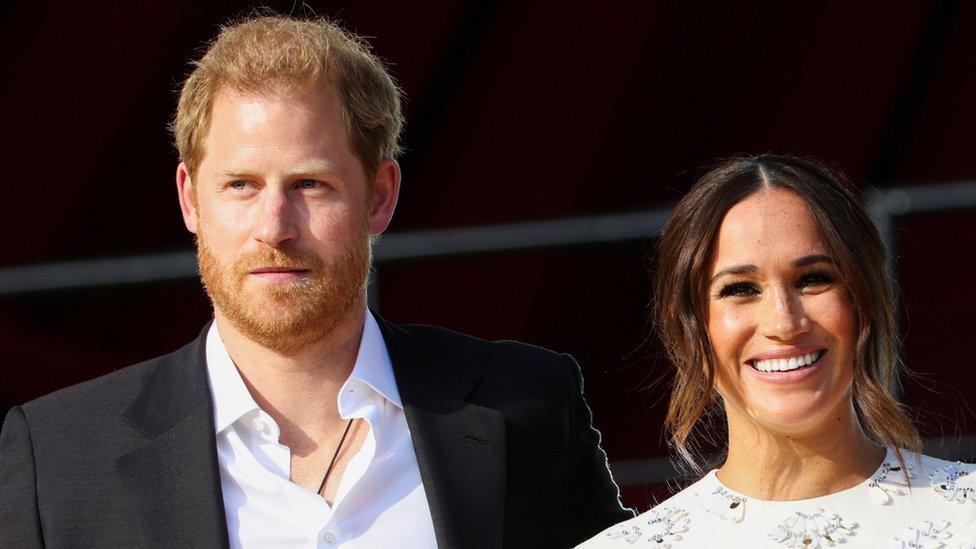Harry and Meghan misused in fake investment endorsement
- Published

Prince Harry and Meghan are among the celebrities misused in fake investment adverts
Fake endorsements from the Duke and Duchess of Sussex are being used on social media to promote Bitcoin-related investment schemes.
Photos and bogus interviews with Prince Harry and Meghan and other celebrities are being used to attract investors.
The Financial Conduct Authority (FCA) says it is increasing worries about scam advertisements.
The number of consumers reporting possible scams to the watchdog has risen by more than 400% in five years.
In 2021, there were more than 34,000 reports from consumers with suspicions about possibly fraudulent investment offers, the FCA says. In 2016, it had been 8,000.
"People should be very wary when they see investment ads offering high returns, even if they appear to be endorsed by celebrities," a spokeswoman for the financial services regulator said.
'Better girlfriend'
The watchdog warns of growing concerns about get-rich-quick scams being advertised through social media or search engines.

Fabricated interviews with Prince Harry and Meghan have previously been used in investment claims - and there appear to be new attempts to use their names in online articles promising instant profits, shared on social-media platforms.
"People earning millions from home by using Harry and Meghan latest advice," says one of the latest fake headlines, in a story also using the logos of news brands, including the BBC, the Daily Mail, the Sun, Forbes, Good Morning Britain and the Guardian.
Another was headlined: "Harry and Meghan shocked everyone in the studio by revealing how they making an extra £128,000 every month."
Articles claim falsely that in TV interviews the couple backed investment schemes related to Bitcoin and crypto-currency trading.
"I let the software run and my profits stacked up like pancakes," a supposed investor is quoted as saying.
"It feels incredible having money rush in this fast and hard."
Another says: "My ex-girlfriend dumped me because I was too poor.
"Now I'm a multi-millionaire and I have an even better girlfriend."
Go wrong
The online articles carry bogus claims of the backing of other wealthy figures, including Bill Gates, Sir Richard Branson and Mark Zuckerberg.
The investment articles, seen by the FCA, appear to be linked to a website in Eastern Europe.
The website was contacted but has not replied - and the online link now goes to a general feature on the Royal Family.
Representatives of the Duke and Duchess of Sussex have been alerted.
The FCA wants consumers to be more aware of the threat of scams and to check if a company is regulated in the UK and on the financial-services register, external.
"If it isn't, you are very unlikely to have any protection if things go wrong," the FCA spokeswoman said.

There are warnings of increasing numbers of bogus adverts using celebrity endorsements
Action Fraud, the national reporting centre for fraud and cyber-crime, says scammers are using social media to target a younger age group.
This can involve "fake testimonials" and pictures of famous people to "help the investment seem legitimate", it says.
In the financial year between April 2020 and March 2021, there were were 500 investment frauds found using bogus celebrity endorsements, with losses of over £10m, according to Action Fraud.
Citizens Advice director of policy Matthew Upton said the "consequences can be truly devastating".
"These schemes are becoming ever-more sophisticated and can leave people feeling incredibly vulnerable and isolated - to the point where they can't even tell their family and friends what has happened," he added.